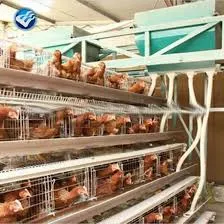Optimal Housing Solutions for Laying Hens in Commercial Operations
Dec . 10, 2024 22:04 Back to list
Optimal Housing Solutions for Laying Hens in Commercial Operations
The Advantages of Chicken Layers Cage Systems in Modern Poultry Farming
In the realm of modern poultry farming, efficiency, productivity, and animal welfare have become key focal points for farmers aiming to maximize output while maintaining ethical standards. One such innovative solution that has gained popularity is the chicken layers cage system. This article explores the benefits and considerations of using layers cages in chicken farming, as well as their impact on the overall poultry industry.
What are Chicken Layers Cages?
Chicken layers cages are specially designed housing systems for hens that are primarily raised for egg production. These cages are typically organized in rows and tiers, allowing for a high-density layout while ensuring each bird has enough space to move, lay eggs, and access food and water. The design of these cages aims to facilitate optimal egg-laying conditions, reduce diseases, and streamline the management of the flock.
Improved Egg Production Efficiency
One of the primary advantages of using layers cages is the significant improvement in egg production efficiency. In a controlled environment with regulated light, temperature, and nutrition, hens in layers cages tend to lay more eggs compared to those in free-range systems. Studies have shown that hens in cages can produce 15-20% more eggs annually than their free-range counterparts. This increased productivity not only benefits farmers economically but also helps meet the growing global demand for eggs.
Space Utilization and Resource Management
Layers cages optimize space utilization by allowing a higher number of hens to be housed in a smaller area. This is particularly important in regions where land is scarce and expensive. By maximizing space, farmers can reduce their overall operational costs related to land, feed, and labor. Furthermore, with targeted feeding systems in place, layers cages minimize feed waste, ensuring that resources are used efficiently.
chicken layers cage

Disease Management and Bird Health
Another significant benefit of chicken layers cages is the enhanced ability to manage diseases. Caging systems limit the hens' exposure to external pathogens and reduce the spread of diseases that can occur in more open environments. The controlled environment of layers cages also facilitates routine health checks and vaccinations, ensuring optimal bird health. Good ventilation and climate control within the cages can further prevent respiratory issues, contributing to the longevity and productivity of the flock.
Improved Egg Quality and Hygiene
When it comes to egg quality, layers cages offer notable advantages. The design of these cages often includes features that prevent eggs from coming into contact with contaminated surfaces. As a result, the eggs produced in layers cages are generally cleaner and less likely to be affected by external factors. Moreover, automated systems for collecting eggs help maintain hygiene and reduce handling, further ensuring the safety and quality of the final product.
Animal Welfare Considerations
While layers cages present numerous advantages, animal welfare concerns have drawn considerable attention in recent years. Critics argue that the confinement of hens in cages restricts their natural behaviors, such as nesting, perching, and foraging. In response to these concerns, many poultry farmers have started adopting enriched cage systems, which provide additional space and perches, allowing hens to exhibit more natural behaviors while still benefiting from the advantages of caged environments.
Conclusion
In conclusion, chicken layers cage systems represent a crucial advancement in the poultry industry, offering multiple benefits such as increased productivity, efficient resource management, improved disease control, and higher egg quality. While it is essential to address animal welfare concerns, especially with growing consumer demand for ethically produced food, the ongoing evolution of cage design will likely continue to improve conditions for hens while maintaining high levels of productivity. As the world grapples with the challenges of feeding a growing population, layers cages may play a pivotal role in shaping the future of poultry farming. The key will be striking a balance between efficiency and ethical considerations, ensuring that both farmers and animals can thrive in this rapidly changing industry.
-
Automatic Feeding Line System-Pan Feeder Nipple Drinker|Anping County Yize Metal Products Co., Ltd.
NewsJul.29,2025
-
Hot Sale 24 & 18 Door Rabbit Cages - Premium Breeding Solutions
NewsJul.25,2025
-
Automatic Feeding Line System Pan Feeder Nipple Drinker - Anping County Yize Metal Products Co., Ltd.
NewsJul.21,2025
-
Automatic Feeding Line System Pan Feeder Nipple Drinker - Anping County Yize Metal Products Co., Ltd.
NewsJul.21,2025
-
Automatic Feeding Line System - Anping Yize | Precision & Nipple
NewsJul.21,2025
-
Automatic Feeding Line System - Anping Yize | Precision & Nipple
NewsJul.21,2025






